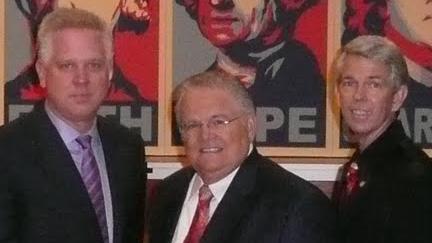Three completely marginal amigos
2006: At USA Today, Mark I Pinsky explains how John Hagee is a central figure in a new alliance between “Southern Jews and Evangelicals”:
…[I]n November 2005, more than 1,000 evangelicals from central Florida gathered at a local hotel and raised more than $100,000 to buy an ambulance for Magen David Adom, Israel’s Red Cross. Local rabbis delivered both the invocation and the benediction. As event sponsors promised, there was no effort to proselytize any of the estimated 200 Jewish guests. The Rev. John Hagee of San Antonio gave a thunderous keynote address supporting the Jewish state that he could easily have delivered at a rally for Israel’s hard-line Likud Party.
2011: At USA Today, Mark I Pinsky explains how John Hagee is an absolutely marginal figure in Evangelicalism, a bogeyman puffed up by liberal websites but in truth so irrelevant that we don’t even have to spell his name correctly:
These days, it’s hard to turn to liberal websites, public radio or MSNBC without encountering some “investigation” or “exposé” of a splinter, marginal figure, such as David Barton or John Haggee, from the evangelical world — followed by some tenuous if not tortured connect-the-dots link to a presidential or congressional candidate.
As readers may recall, Hagee’s link to John McCain in 2008 was so “tenuous” that McCain was obliged to issue a repudiation of Hagee’s endorsement after a sermon came to light in which Hagee referred to Hitler as a “hunter” sent by God to persuade Jews to move to Israel. That sermon was unearthed not by a professional religion writer such as Pinsky, but by an independent amateur researcher named Bruce Wilson.
Hagee as Forrest Gump: marginal figure appears on stage with John McCain
Pinsky complains that:
…beginning in 2006 and every two years since in the run-up to the presidential and off-year congressional elections, books and articles suddenly appear — often written by Jews — about the menace and weirdness of evangelical Christianity.
Though some of the writers hail from Brooklyn or Washington, D.C., the tone is what I’d call “Upper West Side hysteric,” a reference to the fabled New York City neighborhood.
…Chief among these are books such as Michelle Goldberg’s Kingdom Coming: The Rise of Christian Nationalism, Rabbi James Rudin’s The Baptizing of America, and several titles by Sara Diamond.
Bill Berkowitz has written a response:
The essence of the matter is this: A number of conservative writers and political pundits have taken to attacking left-wing investigative reporters, researchers and journalists over their reporting about Dominionism, Christian Reconstructionism and the New Apostolic Reformation – three little-known theological and ideological movements gaining ground on the Christian Right.
The subtext of [Pinsky’s] recent contribution to this newly minted genre appears to be a not-so-subtle message to Jewish writers, researchers and critics of the Religious Right: “Don’t rock the boat.”
Of course one should be careful not to conflate Evangelicalism or neo-Pentecostalism in general with the Christian Right. Evangelicals have a range of political and religious views, and a “top-down” research approach which concentrates on Christian Right ideologues and texts should not claim to have the full picture of Evangelicalism (I’ve previously complained about pseudo-research on Islam which suffers from just this failing). However, Fred Clarkson explains that the writers Pinsky attacks do know the difference between Evangelicals and the Christian Right:
I would ordinarily be glad to join Pinsky in criticizing people who make sweeping, factually unsupported generalizations about evangelicals. Good reporting and scholarship requires using fair terms, making reasonable distinctions, and drawing well-founded conclusions based on facts. But I cannot join Pinsky in this case, because none of the writers he names engage in the behavior he complains about…
The fact is that the Christian Right is a part of Evangelicalism, whether or not Evangelicals or their supporters find this observation congenial. Evangelicalism is the context in which the Christian Right operates, and it is from Evangelicalism that the Christian Right draws most of its support and influence. And understanding the Christian Right increasingly means understanding the likes of Barton and Hagee, rather than cheesy televangelists from the 1980s.
Some religion journalists appear not to know much about trends such as the New Apostolic Reformation, and have complacently concluded that their ignorance indicates insignificance. There is also some scepticism due to the fact that many of those writing on the subject have an activist motivation – this motivation is often politically progressive, although various kinds of dissenting conservative Evangelicals have also made contributions. However, it should be needless to point out that what motivates someone to write about a subject is a different matter from the quality of the resulting research or analysis, which can be assessed independently.
But in Pinsky’s case, the 2006 quote above suggests another explanation for his dismissive attitude. Bill writes:
…[Pinsky] being so off base about David Barton, and John Hagee, I originally figured that he might not really be paying attention to current developments.
But Rachel Tabachnick disabused me of that notion. In a conversation thread on her Facebook page, Tabachnick pointed out that Pinsky “has written repeatedly about Hagee in the Orlando Sentinel, in USA Today and in his own book. … This is not ignorance. This was willfully misleading readers.”
Filed under: Uncategorized | 5 Comments »




